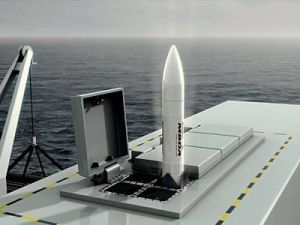U.S. Official Says NATO Benefits From Missile Agreement
By Jim Garamone
American Forces Press Service
The agreement between the United States and Poland on ballistic missile defense is important for the relationship between the two countries and for the NATO alliance, a senior State Department official said today.
John C. Rood, acting undersecretary of state for arms control and international security — who helped to negotiate the agreement — talked with reporters at the State Department today.
The agreement, signed Aug. 20, will allow the United States to place 10 interceptor missiles in Poland to defend the European NATO allies from a missile strike from a rogue state like Iran. A radar site for the system will be built in the Czech Republic.
There are two pieces to the agreement, Rood said. “One is a ballistic missile defense agreement,” he said. “The second is a declaration on a strategic cooperation between the United States and Poland.”
The missile defense agreement is the culmination of a NATO initiative approved by alliance leaders at the alliance’s summit in Bucharest, Romania, in April. NATO leaders agreed that the missile threat from rogue regimes was growing, and that a system needed to be in place. The summit also called to expand this initial area by exploring options for a NATO-wide architecture for missile defense.
“This capability will be very important to our NATO allies, for their security, just as it’s very important for the United States and Poland,” Rood said.
NATO remains concerned about the missile threat. “As if on cue, the Iranians just in the last couple of weeks have launched a space launch vehicle, which again demonstrates additional capabilities and underscores the concerns we have about the growing missile threat from countries like Iran,” Rood said. “It’s not limited to Iran, I should hasten to add, but it’s certainly an additional matter.”
The agreement covers how the missile defense facility would be operated, Rood said. It also covers what the respective roles of the different parties would be, and their rights.
For example, he said, the United States has undertaken a commitment not to conduct flight tests of the ballistic defense interceptors that would be stationed there out of that site.
The agreement also covers other issues such as command and control, protection of the environment and base access.
The strategic cooperation declaration is the political agreement between the countries. In it, the two countries agreed to deepen and expand security relationships, Rood said. The agreement looks at ways to increase cooperation and establishes a framework to work together through establishing a high-level strategic cooperation consultative group.
“We also talked about the desire of the United States and Poland to pursue cooperation involving air and missile defense cooperation,” he said.
The agreement commits the United States to deploy an Army Patriot battery to Poland.
“We’ll begin those deployments once, of course, we reach the necessary agreements with the Poles, and that could begin next year,” Rood said. “And then we set the goal of establishing a garrison for the U.S. Army Patriot battery in Poland by the year 2012.”
Other aspects — such as information sharing, defense-industrial research and technology cooperation — also are discussed in the agreement.
“It’s a pretty broad coverage in terms of the subject matter in that document, and I think it’s befitting of the fact that this is going to be a … substantially changed relationship between the United States and Poland, in that you will have a much greater level of defense cooperation,” Rood said.
Source:
U.S. Department of Defense
Office of the Assistant Secretary of Defense (Public Affairs)

 von
von 